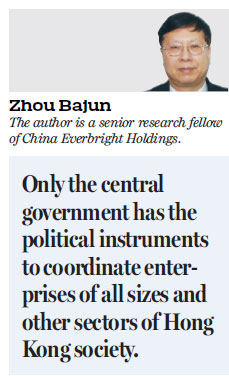Time for HK to put more emphasis on 'one country'
Updated: 2018-09-12 07:24
(HK Edition)
|
|||||||
Zhou Bajun offers advice on the best strategy for the govt to achieve social stability and further integrate with the nation
The special administrative region government is expected to ban the Hong Kong National Party according to Section 8 of the Societies Ordinance, unless there is an unforeseen turn of events. When the HKNP is banned, however, the SAR government will not find it easier to contain separatism and protect the country's sovereignty, national security and development interest, but rather harder. First, the HKNP, its puppet master behind the scenes and supporters in the audience will not give up; they will fight back even more aggressively by whatever means. Second, central government officials in charge of Hong Kong and Macao affairs have reminded the SAR government of citing Section 9 of the Crimes Ordinance in prosecuting HKNP convener Andy Chan Ho-tin. Third, the patriotic camp in Hong Kong has urged the SAR government to introduce the national security legislation according to Article 23 of the Basic Law of the Hong Kong SAR as soon as possible. And fourth, the above three are unfolding amid intense efforts by the US government to contain China, the quickening readjustment of the global power structure and worsening relations between China and the US.
This article does not focus on the four developments mentioned above but a vital question instead: What strategy should the SAR adopt for governing Hong Kong?
After taking office as chief executive of the HKSAR and its government, Carrie Lam Cheng Yuet-ngor outlined two important views. One was that she did not believe the pro-independence forces in Hong Kong were a worthy opponent yet. The other was that she would focus on mending the divisions in Hong Kong society.

Soon after that, however, the separatist forces put on a show of defiance to tell the SAR government as well as the central government authorities they were not taking defeat lying down.
To mend the cracks in Hong Kong society, Lam reached out to the Democratic Party, the oldest member of the opposition camp, and members of the Legislative Council representing certain professional constituencies. But, personal friendship cannot replace confrontations between political factions or collective interests. As a result, the traditional "pan-democrats" have held on to their anti-central government standing in the past year or so while marching to the drum beat of the separatist forces.
Moreover, the focus of political rivalry in Hong Kong has started shifting. As the US government adjusts its global strategy and regards China as one of its main rivals, the political camps in Hong Kong will regroup according to their allegiance to the US or the motherland. And the new line of differentiation will divide Hong Kong society politically again for sure.
The Basic Law stipulates the chief executive is accountable not only to the central government but also to the HKSAR. This is why some people assume the CE has two "bosses" and both are equally important. That assumption, however, is not what the Basic Law pertains to, because the Basic Law also stipulates that Hong Kong is an SAR directly under the jurisdiction of the Central People's Government. Besides, being accountable to the HKSAR does not mean following the anti-central government forces' whims because the latter only represents a tiny portion of Hong Kong society.
Faced with political conflicts that are gaining complexity and intensity, Hong Kong governance must emphasize "one country", follow the leadership of the central government authorities, rely on the patriotic camp and unite the great majority of Hong Kong residents.
Meanwhile, Hong Kong's class struggle is also gaining intensity. The current-term SAR government is faced with a difficult situation, which includes challenges from finding a proper way to abolish the Mandatory Provident Fund offsetting mechanism and extend maternal leave, and deciding to keep the Fanling golf resort or convert it into a residential housing estate. Taking a closer look, the SAR government is met with strong resistance from major property developers over increasing land supply for residential housing development and opposition from small- and medium-sized enterprises over the abolishment of the MPF offsetting mechanism. Frankly, the CE and SAR government do not have the political instruments to handle the major property developers and SMEs at the same time. In the face of worsening class struggle, the SAR government also needs to rely on the Beijing authorities. Only the central government has the political instruments to coordinate enterprises of all sizes and other sectors of Hong Kong society.
The incumbent SAR government faces signs of economic downturn in its second year in office. Hong Kong's economy is highly dependent on foreign trade and already feeling the impact of the trade war launched by the US government against China. The Hong Kong stock market and the dollar peg exchange rate mechanism are already feeling the pain from intensifying US trade protectionism and will come under even more pressure as the US-China trade row continues. Hong Kong's real estate market will find it impossible to continue to rise when its currency is weakened by the ongoing US-China trade war while interest rates go up and economic growth slows down.
All these negative factors require Hong Kong to pick up the pace of integrating its own development into the country's overall development strategy. However, the SAR government has been so focused on the advantage of "two systems" and so reluctant to be creative about overcoming the inherited "double boundaries" with the mainland that it has yet to take the lead in the Guangdong-Hong Kong-Macao Greater Bay Area development. To advance the structural transformation of Hong Kong's economy and development, the SAR government must emphasize "one country" as well.
(HK Edition 09/12/2018 page8)